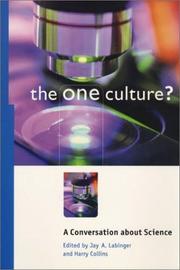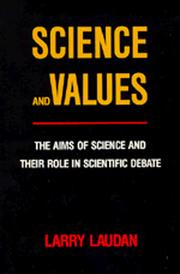| Listing 1 - 10 of 30 | << page >> |
Sort by
|
Book
ISBN: 9783110763577 3110763575 Year: 2024 Publisher: Berlin ; Boston : De Gruyter Mouton,
Abstract | Keywords | Export | Availability | Bookmark
 Loading...
Loading...Choose an application
- Reference Manager
- EndNote
- RefWorks (Direct export to RefWorks)
Science communication is becoming increasingly important. Research institutions, scientists and science communicators want to engage with society, share their knowledge and build trust. At the same time, it is about competition for research funds and top personnel. So how do you get it right - and what do you need to consider when developing your communication strategy? This handy and entertaining book provides the basics of goal-oriented science communication. It is aimed at career-building scientists and anyone who wants to take their first steps in the field of science communication. Experienced international authors in the field share their essential thoughts on important aspects of contemporary science communication.
Book
ISBN: 9791036509711 1783744103 9781783744107 9781783744121 178374412X 9781783744138 1783744138 9781783744145 1783744146 9781783744602 178374460X 1783744111 9781783744114 Year: 2018 Publisher: Cambridge Open Book Publishers
Abstract | Keywords | Export | Availability | Bookmark
 Loading...
Loading...Choose an application
- Reference Manager
- EndNote
- RefWorks (Direct export to RefWorks)
In this bold and original study, Jeff Kochan constructively combines the sociology of sientific knowledge (SSK) with Martin Heidegger's early existential conception of science. Kochan shows convincingly that these apparently quite different approaches to science are, in fact, largely compatible, even mutually reinforcing. By combining Heidegger with SSK, Kochan argues, we can explicate, elaborate, and empirically ground Heidegger's philosophy of science in a way that makes it more accessible and useful for social scientists and historians of science. Likewise, incorporating Heideggerian phenomenology into SSK renders SKK a more robust and attractive methodology for use by scholars in the interdisciplinary field of Science and Technology Studies (STS). Kochan's ground-breaking reinterpretation of Heidegger also enables STS scholars to sustain a principled analytical focus on scientific subjectivity, without running afoul of the orthodox subject-object distinction they often reject. Science as Social Existence is the first book of its kind, unfurling its argument through a range of topics relevant to contemporary STS research. These include the epistemology and metaphysics of scientific practice, as well as the methods of explanation appropriate to social scientific and historical studies of science. This volume puts concentrated emphasis on the compatibility of Heidegger's existential conception of science with the historical sociology of scientific knowledge, pursuing this combination at both macro- and micro-historical levels. Beautifully written and accessible, this book puts new and powerful tools into the hands of sociologists and historians of science, cultural theorists of science, Heidegger scholars, and pluralist philosophers of science.
Book
ISBN: 0674982789 Year: 2018 Publisher: Cambridge, MA : Harvard University Press,
Abstract | Keywords | Export | Availability | Bookmark
 Loading...
Loading...Choose an application
- Reference Manager
- EndNote
- RefWorks (Direct export to RefWorks)
In 1759 the British Museum opened its doors to the public—the first free national museum in the world. James Delbourgo recounts the story behind its creation through the life of Hans Sloane, a controversial luminary with an insatiable ambition to pit universal knowledge against superstition and few curbs on his passion for collecting the world.
Atlantic slave trade. --- Natural History of Jamaica. --- Royal Society. --- art collecting. --- botany. --- global scientific knowledge. --- human curiosities. --- natural history. --- scientific classification. --- visual knowledge.
Book
Year: 2008 Publisher: Washington, D.C., The World Bank,
Abstract | Keywords | Export | Availability | Bookmark
 Loading...
Loading...Choose an application
- Reference Manager
- EndNote
- RefWorks (Direct export to RefWorks)
This paper presents the first critical review of literature on poverty published in Russia between 1992 and 2006. Using a dataset of about 250 publications in Russian scientific journals, the authors assess whether the poverty research in Russia satisfies the general criteria of a scientific publication and if such studies could provide reliable guidance to the Russian government as it maps out its anti-poverty policies. The findings indicate that only a small proportion of papers on poverty published in Russia in 1992-2006 follow the universally-recognized principles of the scientific method. The utility of policy advice based on such research is questionable. The authors also suggest steps that could, in their view, improve the quality of poverty research in Russia.
Education --- Information Security and Privacy --- Literature --- Papers --- Poverty Monitoring and Analysis --- Poverty Reduction --- Research findings --- Researchers --- Science and Technology Development --- Science Education --- Scientific journals --- Scientific knowledge --- Scientific papers --- Scientific research --- Scientific Research and Science Parks --- Scientists --- Social science --- Tertiary Education
Book
Year: 2008 Publisher: Washington, D.C., The World Bank,
Abstract | Keywords | Export | Availability | Bookmark
 Loading...
Loading...Choose an application
- Reference Manager
- EndNote
- RefWorks (Direct export to RefWorks)
This paper presents the first critical review of literature on poverty published in Russia between 1992 and 2006. Using a dataset of about 250 publications in Russian scientific journals, the authors assess whether the poverty research in Russia satisfies the general criteria of a scientific publication and if such studies could provide reliable guidance to the Russian government as it maps out its anti-poverty policies. The findings indicate that only a small proportion of papers on poverty published in Russia in 1992-2006 follow the universally-recognized principles of the scientific method. The utility of policy advice based on such research is questionable. The authors also suggest steps that could, in their view, improve the quality of poverty research in Russia.
Education --- Information Security and Privacy --- Literature --- Papers --- Poverty Monitoring and Analysis --- Poverty Reduction --- Research findings --- Researchers --- Science and Technology Development --- Science Education --- Scientific journals --- Scientific knowledge --- Scientific papers --- Scientific research --- Scientific Research and Science Parks --- Scientists --- Social science --- Tertiary Education
Book
ISBN: 1282239929 9786612239922 0226675378 9780226675374 9780226675343 0226675343 9781282239920 6612239921 Year: 2009 Publisher: Chicago : University of Chicago Press,
Abstract | Keywords | Export | Availability | Bookmark
 Loading...
Loading...Choose an application
- Reference Manager
- EndNote
- RefWorks (Direct export to RefWorks)
The discovery of the New World raised many questions for early modern scientists: What did these lands contain? Where did they lie in relation to Europe? Who lived there, and what were their inhabitants like? Imperial expansion necessitated changes in the way scientific knowledge was gathered, and Spanish cosmographers in particular were charged with turning their observations of the New World into a body of knowledge that could be used for governing the largest empire the world had ever known.As María M. Portuondo here shows, this cosmographic knowledge had considerable st
Cosmography --- Science --- Cosmology --- History. --- Historiography. --- America --- Spain --- Discovery and exploration --- Spanish. --- History --- Historiography --- discovery, exploration, expansion, new world, europe, scientific knowledge, empire, governance, administration, cosmography, epistemology, nature, history, philosophy, spain, renaissance, humanism, ptolemy, navigation, mathematical rationalism, tordesillas question, alonso de santa cruz, juan herrera, pilots, maps, cartography, lopez velasco, lunar eclipse, bautista gesio, patronage, nonfiction.

ISBN: 1282738445 9786612738449 0226467244 9780226467245 9780226467221 0226467228 0226467236 0226467228 9780226467221 Year: 2001 Publisher: Chicago : University of Chicago Press,
Abstract | Keywords | Export | Availability | Bookmark
 Loading...
Loading...Choose an application
- Reference Manager
- EndNote
- RefWorks (Direct export to RefWorks)
So far the "Science Wars" have generated far more heat than light. Combatants from one or the other of what C. P. Snow famously called "the two cultures" (science versus the arts and humanities) have launched bitter attacks but have seldom engaged in constructive dialogue about the central issues. In The One Culture?, Jay A. Labinger and Harry Collins have gathered together some of the world's foremost scientists and sociologists of science to exchange opinions and ideas rather than insults. The contributors find surprising areas of broad agreement in a genuine conversation about science, its legitimacy and authority as a means of understanding the world, and whether science studies undermines the practice and findings of science and scientists. The One Culture? is organized into three parts. The first consists of position papers written by scientists and sociologists of science, which were distributed to all the participants. The second presents commentaries on these papers, drawing out and discussing their central themes and arguments. In the third section, participants respond to these critiques, offering defenses, clarifications, and modifications of their positions. Who can legitimately speak about science? What is the proper role of scientific knowledge? How should scientists interact with the rest of society in decision making? Because science occupies such a central position in the world today, such questions are vitally important. Although there are no simple solutions, The One Culture? does show the reader exactly what is at stake in the Science Wars, and provides a valuable framework for how to go about seeking the answers we so urgently need. Contributors include: Constance K. Barsky, Jean Bricmont, Harry Collins, Peter Dear, Jane Gregory, Jay A. Labinger, Michael Lynch, N. David Mermin, Steve Miller, Trevor Pinch, Peter R. Saulson, Steven Shapin, Alan Sokal, Steven Weinberg, Kenneth G. Wilson
Science --- Science and state. --- Normal science --- Philosophy of science --- Science policy --- State and science --- State, The --- Science and society --- Sociology of science --- Social aspects. --- Philosophy. --- Government policy --- Sociology of knowledge --- science, legitimacy, scientific knowledge, polanyi, turing, wittgenstein, sociology, public opinion, policy, government, popular culture, physics, history, epistemography, research questions, social construction, antiscience, relativism, methodology, contingency, overdetermination, experience, authority, historiography, philosophy, academia, nonfiction.

ISBN: 1283058499 9786613058492 0226668258 9780226668253 0226668029 9780226668024 0226668037 9780226668031 Year: 1995 Publisher: Chicago University of Chicago Press
Abstract | Keywords | Export | Availability | Bookmark
 Loading...
Loading...Choose an application
- Reference Manager
- EndNote
- RefWorks (Direct export to RefWorks)
This ambitious book by one of the most original and provocative thinkers in science studies offers a sophisticated new understanding of the nature of scientific, mathematical, and engineering practice and the production of scientific knowledge. Andrew Pickering offers a new approach to the unpredictable nature of change in science, taking into account the extraordinary number of factors-social, technological, conceptual, and natural-that interact to affect the creation of scientific knowledge. In his view, machines, instruments, facts, theories, conceptual and mathematical structures, disciplined practices, and human beings are in constantly shifting relationships with one another-"mangled" together in unforeseeable ways that are shaped by the contingencies of culture, time, and place. Situating material as well as human agency in their larger cultural context, Pickering uses case studies to show how this picture of the open, changeable nature of science advances a richer understanding of scientific work both past and present. Pickering examines in detail the building of the bubble chamber in particle physics, the search for the quark, the construction of the quarternion system in mathematics, and the introduction of computer-controlled machine tools in industry. He uses these examples to address the most basic elements of scientific practice-the development of experimental apparatus, the production of facts, the development of theory, and the interrelation of machines and social organization.
Science --- Science and society --- Sociology of science --- Normal science --- Philosophy of science --- Philosophy. --- Social aspects. --- scientific knowledge, science, math, engineering, stem, technology, practice, production, machines, instruments, facts, theory, industry, machine tools, computer controlled, mathematics, quarternion system, quark, particle physics, bubble chamber, experimental apparatus, social organization, philosophy, ethics, experimentation, nonfiction, history.
Book
ISBN: 1421434768 1421434784 1421434776 Year: 2019 Publisher: Johns Hopkins University Press
Abstract | Keywords | Export | Availability | Bookmark
 Loading...
Loading...Choose an application
- Reference Manager
- EndNote
- RefWorks (Direct export to RefWorks)
Are there two kinds of problems - the scientific and the philosophic - each requiring different methods for solution? Or are there, rather, two different ways of approaching a problem, each yielding a different answer according to the method used? Biomedical researcher Sir Harold Himsworth urges scientists not to shy away from using scientific methods to grapple with problems traditionally accepted as belonging to the province of philosophy. The difference between science and philosophy lies not in the problems to which they are directed, Himsworth argues, but rather in the methods they use for solving them. To the scientist, a proposition is something to be investigated; to the philosopher, something to be accepted as a basis for thought. Since the development of the scientific method, substantial progress has been made toward mastering problems in the natural environment. If we are ever to attain a degree of control over problems that derive from human activities, Himsworth claims that we only succeed by approaching them in a comparably objective way.
Wissenschaft. --- Philosophie. --- Wetenschap. --- Denkwijze. --- Probleemoplossing. --- Kennistheorie. --- Wissenschaft --- Philosophie --- Erkenntnistheorie --- Science --- Problem solving. --- Knowledge, Theory of. --- Knowledge. --- Philosophy. --- Methodology. --- methods. --- Scientific knowledge - Philosophical perspectives --- Methodology --- Psychology --- Decision making --- Executive functions (Neuropsychology) --- Natural science --- Natural sciences --- Science of science --- Sciences --- Epistemology --- Theory of knowledge --- Philosophy --- Scientific method --- Logic, Symbolic and mathematical --- Normal science --- Philosophy of science

ISBN: 1282383000 9786612383007 0520908112 9780520908116 0520052676 9780520052673 0520057430 9780520057432 Year: 1984 Publisher: Berkeley : University of California Press,
Abstract | Keywords | Export | Availability | Bookmark
 Loading...
Loading...Choose an application
- Reference Manager
- EndNote
- RefWorks (Direct export to RefWorks)
Laudan constructs a fresh approach to a longtime problem for the philosopher of science: how to explain the simultaneous and widespread presence of both agreement and disagreement in science. Laudan critiques the logical empiricists and the post-positivists as he stresses the need for centrality and values and the interdependence of values, methods, and facts as prerequisites to solving the problems of consensus and dissent in science.
Science --- Philosophy. --- cognitive values. --- consensus. --- covariance fallacy. --- decision making. --- dissent. --- empirical evidence. --- empiricism. --- ethics. --- goal evaluation. --- kuhn. --- logic. --- methodology. --- natural sciences. --- nonfiction. --- philosophy of science. --- philosophy. --- post positivism. --- realist axiology. --- research. --- reticulated model. --- science and technology. --- science. --- scientific change. --- scientific community. --- scientific debate. --- scientific knowledge. --- scientific method. --- scientific rationality. --- scientific revolutions.
| Listing 1 - 10 of 30 | << page >> |
Sort by
|

 Search
Search Feedback
Feedback About
About Help
Help News
News